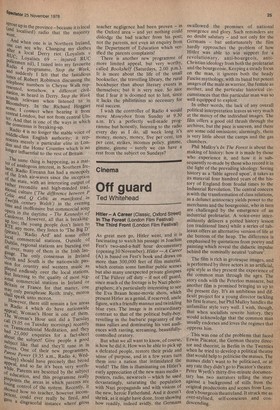Cinema
Off guard
Ted Whitehead
Hitler — A Career (Classic, Oxford Street) in The Forest (London Film Festival) The Third Front (London Film Festival) As great men go, Hitler went, and it is fascinating to watch his passage in Joachim Fest's two-and-a-half hour documentary (opening 30 November). Hitler —A Career (A) is based on Fest's book and draws on more than 300,000 feet of film material, which contain some familiar public scenes but also many unexpected private glimpses of The Fiihrer off duty – if not off guard, since much of the footage is by Nazi photographers; it's particularly interesting to see the Eva Braun home-movie shots, which present Hitler as a genial, if reserved, uncle figure, with a friendly manner and twinkling blue eyes. The image is in extraordinary contrast to that of the political bully-boy, revelling in the barbaric pageantry of the mass rallies and dominating his vast audiences with ranting, screaming, beautifully But what we all want to know, of course, is how he did it. How was he able to pick up a defeated people, restore their pride and sense of purpose, and in a few years turn them into a nation that intimidated the world? The film is illuminating on Hitler's early appreciation of the new mass media – posters, radio, newsreels – which he used devastatingly, saturating the population with Nazi propaganda and with visions of the new, heroic Fatherland. And it doesn't shrink, as it might have done, from showing how readily, indeed avidly, the Germans swallowed the promises of national resurgence and glory. Such reminders are no doubt salutary – and not only for the Germans – but unfortunately the film hardly approaches the problem of how Hitler was able to win support for a revolutionary, anti-bourgeois, antiChristian ideology from both the proletariat and the bourgeoisie. Keeping a steady focus on the man, it ignores both the heady Fascist mythology, with its banal but potent images of the male as warrior, the female as mother, and the particular historical circumstances that this particular man was so well equipped to exploit.
In other words, the lack of any overall political interpretation leaves us very much at the mercy of the individual images. The film offers a good old thrash through the archives, but the pace is uneven, and there are some odd omissions; alarmingly, there is very little about the camps and the gas chambers.
Phil Mulloy's In The Forest is about the making of history: how it is made by those who experience it, and how it is subsequently re-made by those who record it in the light of the prevailing ideology. Seeing history as a 'fable agreed upon', it takes as its material four hundred years of the history of England from feudal times to the Industrial Revolution. The central concern is with the transformation of class relations, as a defunct aristocracy yields power to the merchants and the bourgeoisie, who in turn are challenged by the emergence of an industrial proletariat. A voice-over intermittently delivers a potted history lesson (on traditional lines) while a series of tableaux offers an alternative version of life at the bottom of the heap. The difference is emphasised by quotations from poetry and painting which reveal the didactic impulse behind the nominally neutral 'culture'.
The film is rich in grotesque images, and is performed by three actors in an artificial, epic style as they present the experience of the common man through the ages. The story ends with the Peterloo massacre, but another film is promised bringing us up to the present day. It's an ambitious and difficult project for a young director tackling his first feature, but Phil Mulloy handles the unfamiliar style very well. I wish, though, that when socialists rewrite history, they would acknowledge that the common man usually endorses and loves the regimes that oppress him.
This was one of the problems that faced Erwin Piscator, the German theatre director and theorist, in Berlin in the Twenties when he tried to develop a political theatre that would help to politicise the masses. The masses didn't want to be politicised, or at any rate they didn't go to Piscator's theatre. Peter Wyeth's thirty-five-minute documentary has two narrators telling the story against a background of stills from the original productions and scenes from London's bourgeois theatreland. It struck me as over-stylised, self-conscious and condescending.


































 Previous page
Previous page